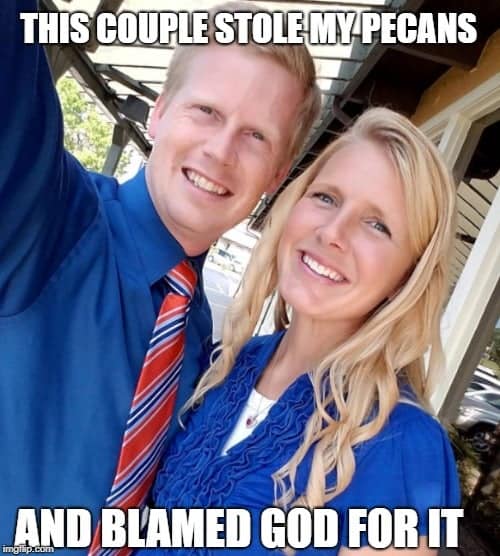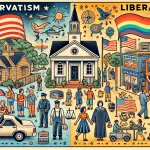Baptist College Handbook Authorizes ‘Full Access’ to Students’ Social Media Accounts, reads a Christianity Today headline. “Campus policies at schools like Louisiana College stir debate over whether regulating personal posts protects students or silences criticism,” it’s byline informs readers. Wait, a minute, how is this a debate? These are adults we’re talking about!
Therein, perhaps, lies the problem. Private Christian colleges like Louisiana College frequently don’t treat their students as adults to begin with. Instead, they create rules for everything from when they can talk to members of the opposite sex to where on campus they can have wet hair.
Criticism of a Southern Baptist college’s social media policy by a former professor has highlighted Christian higher education’s quest to balance free speech online with enforcing institutional codes of conduct.
There’s a piece of this that actually makes sense and is very familiar. We’ve all heard stories about police officers involved in high profile shootings who, it later turns out, regular posted racist memes on facebook. Where and in what situations should institutional codes of conduct involve a review of individuals’ facebook posts? Should people report concerning facebook posts to individuals’ employers, if they are employed in certain professions?
But here we’re not talking about individuals employed in specific professions. Here we’re talking about college students, who tend to be in their late teens or early twenties, and are still in the process of working out who they are. Just what does Louisiana College’s monitoring of students’ social media look like?
From the Louisiana College (LC) handbook:
Social networking sites may be regularly monitored by a number of sources within LC (e.g., Athletics, Student Development, Information Technology, and Campus Security) or authorized vendors engaged by LC to monitor social media.
- If you participate in certain high-profile student activities, you may be required to provide full access to your personal social media to selected employees of LC or authorized vendors.
- If you discover inappropriate information on the social media site of any LC student, you are required to contact the Dean of Students or other LC administrative staff member. You must not take action on your own accord (e.g., hazing or any form of punishment).
Any violation of law or college policy (e.g., the College’s Policy on Prohibited Harassment and Discrimination, Student Rules of Conduct, or Hazing Policy) or evidence of such violation in your social media content is subject to investigation and sanction by the College and/or law enforcement agencies.
Let’s just pause to note that this policy allows Louisiana College to hire vendors to monitor its students’ social media accounts. That’s some chutzpah.
According to this policy, while Louisiana College and the vendors it engages may monitor all of its students on social media, students who participate in “certain high-profile student activities” must turn in their login information to either Louisiana College or its vendors. Additionally, every Louisiana College student is required to monitor and report on other students, turning the entire student body into a sort of police state.
Yes, I know, I know. “If you see something, say something.” We’ve become familiar with this slogan in our airports, our schools, and our public spaces—and we can debate whether this is a good idea. But when the student rules of conduct (which I couldn’t find copy of) likely prohibits things like premarital sex or unmonitored fraternizing with the opposite sex—such policies are common at Christian colleges—this monitoring and reporting requirement starts to take on different dimensions.
I was a conservative evangelical homeschool graduate when I went off to college. My computer use had been monitored, and I’d had limited opportunity to engage with people outside of my homeschool and church community. My parents, though, sent me to a state college. They believed they’d equipped me effectively to defend my faith. This did mean that when I started having questions and rethinking certain things, there wasn’t anyone breathing down my back or reporting on me. My college dorm had a very live-and-let-live atmosphere.
But then, that’s exactly what Christian colleges like Louisiana College are trying to prevent. They don’t want their dorms to be environments where students feel free to try out new ideas, or make choices their parents might agree with. They want their dorms to be places where students hold each other accountable—that’s Christian speak for friends don’t let friends talk to boys, er, I mean, slide into sin. Not all exploration is considered acceptable. Some exploration should be identified, tamped down on, and snipped off at the bud.
Christian colleges like Louisiana College aren’t in the business of creating spaces where students can explore and figure out who they are. They’re in the business of creating spaces where students can grow into mature Christians. (I have some qualms about using the term mature in this context. It seems to me that there is only so much growing one can do in a bubble, especially one with as many rules as some Christian colleges.)
I suspect that many parents who send their children to Christian colleges are attracted by exactly the sort of monitoring Louisiana College touts in its Student Handbook. These parents want their children to receive a college education in a Christian atmosphere, where they don’t have to worry about class content they find questionable or about friends who cover for friends. Instead, at Louisiana College, their children will have friends who report friends to the administration. Or at least, that’s the hope!
Requiring students engaged in unnamed “high-profile student activities” to preemptively hand over their social media logins to the school authorities helps Louisiana College keep a firm grip on its students by preventing those in visible positions from organizing or advocating anything counter to school policies. After all, having a student’s social media logins means that you can delete their posts or even inactivate their accounts. And being able to watch their every move online means you can drag them to the office the moment they misstep.
This policy is a means of asserting—and maintaining—complete control over the student body. To me, this smacks of a police state. But I suppose that’s okay with Louisiana College, so long as it’s a Christian one.
I have a Patreon! Please support my writing!














